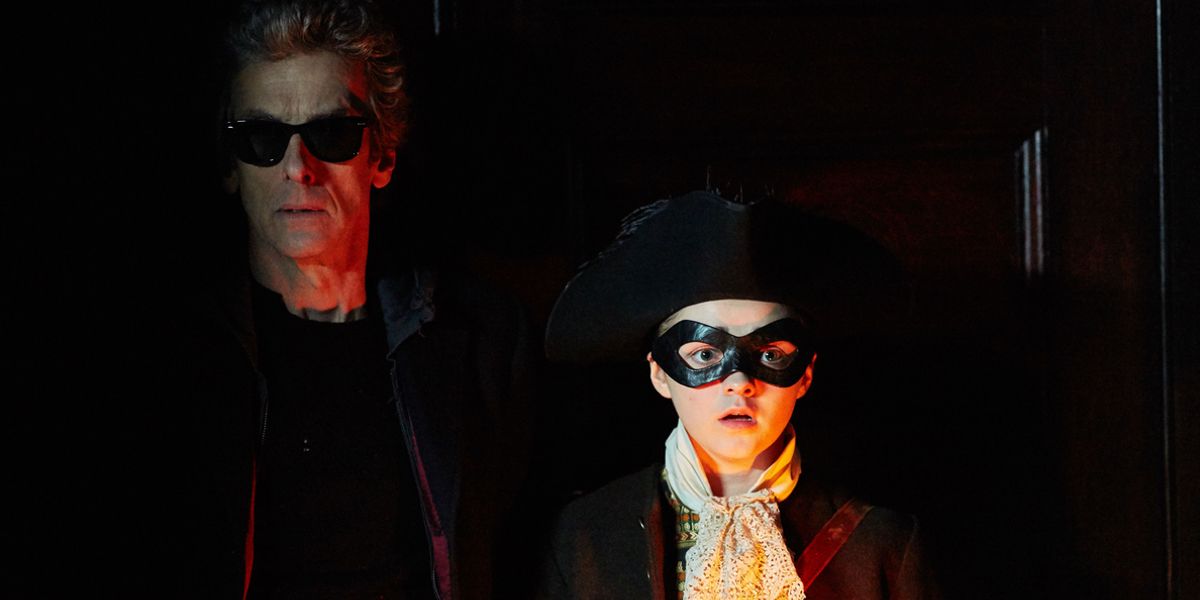[This is a review of Doctor Who season 9, episode 6. There will be SPOILERS.]
-
It might be hard to imagine that an episode in which a fire-breathing lion-man plays a part could also offer one of the best takes on the burden of immortality and why the Doctor travels with a companion, but here we are with 'The Woman Who Lived.' This continuation of last week's 'The Girl Who Died' welcomes back Maisie Williams' Ashildre – some 800 years after the Doctor brought her back to life, and in doing so, also granted her the immortality she never asked for. What seems like a magnificent gift is proven to have emotionally devastating penalties, some of which the Doctor is intimately aware of, while others are uniquely Ashildre's own.
What the episode does, however, in its revisiting of Ashildre's storyline, is dig deep into the ideas and themes that have resonated all season long, and have, at the same time, offered an interesting look at the fallibility of the Doctor and the consequences of his actions. This has been an especially interesting aspect of the season, as, more often than not, plots have been resolved – often against seemingly insurmountable odds – with the Doctor appearing infallible when it comes to battling his enemies. While this feeds into the expectations of the audience, it also has a tendency to make the Doctor not nearly as interesting a character as he could be. Often times, what makes characters great is seeing the way in which they respond to failure, especially when there are lives on the line.
This season has been slowly digging into the cracks and wrinkles in the Doctor's authoritative presence, and what these stories have excavated have been worth the wait. Doctor Who season 9 has largely been concerned with exploring the way in which the Doctor operates on a big picture plane. Taking a stance on doing things for "the greater good" often means a few lives may be lost in order to save the many. This has made for an incredibly alien performance from Peter Capaladi, one in which the Doctor wasn't just seemingly infallible, but also emotionally distant. And yet, by demonstrating a willingness to do anything to save Clara, and by bringing Ashildre back to life, the season has also begun to explore the fissures in the emotionally distant façade being put up by the most recent iteration of the character.
In the last two episodes, it has become clear on what an indescribably massive and cosmic scale the Doctor's choices often register. He has been fond of describing what he does as making ripples not tidal waves in the space-time continuum. And yet, in a moment of weakness or selfishness (or a rare display of emotion), he chose to revive a young woman, and in the process imbue her with eternal life. And then, from her point of view, the Doctor ran away for 800 years.
And it is here that 'The Woman Who Lived' is found exploring what it is to be the Doctor, what it means to have such a cosmic weight placed on his regenerating shoulders, and why he travels with a human companion. For all intents and purposes Maisie Williams' Ashildre serves as a sort of analogue for the Doctor. She, too, is a seemingly immortal being out of time, only she lives that time linearly, whereas the Doctor experiences time in a decidedly non-linear fashion. But, to the credit of writer Catherine Tregenna and certainly, the performance of Williams, the exploration into the similarities between the two go far below the surface of their individual experiences with time.
Like the Doctor, Ashildre has become detached; her experience of life is such that she can no longer remember it all, and is instead surrounded by countless journals that comprise her memories – many of which include having to bear witness to the passing of loved ones. Death is an integral part of human life; it is the boundary that makes every day spent on Earth precious. To move beyond that border is to lose a little of what makes us human. In her performance, Williams is impressive, matching the distance with which Capaldi-Who conducts his emotional affairs, stating she has learned to be her own companion, she is singular, unattached, alone.
As most great episodes do, 'The Woman Who Lived' makes as much out of what it has as it does with what it is missing. The dearth of Jenna Coleman's Clara is present in nearly every scene. And when the notion of companionship rears its head, the idea of a fire-breathing lion-man bringing forth an alien invasion suddenly takes a backseat to the profound declaration of why the Doctor travels with a human companion and why he won't let Ashildre accompany him on his adventures. The Doctor's longevity completely alters his sense of perspective – which illuminates many of his recent "for the greater good" decisions that have seen single lives sacrificed to protect the whole. For the Doctor to travel with another immortal being would completely alter his inherently distorted worldview.
The episode makes good use of its weightier elements, using them to underline the indescribable loneliness of being the Doctor or Ashildre, and the pain that comes from knowing the finitude of everyone around you. In doing so, Doctor Who gives the audience a fascinating glimpse beneath the face of the Doctor and into the character's inner workings, where his emotional distance feels less like a product of his being an alien and more like a mechanism to cope with the rules of his seemingly infinite existence.
To that end, the value of Williams' Ashildre is more than the speculation of who or what she may one day become; it is instead in how she affords insight into the character of Doctor Who. Insight which not only lends a greater understanding of the choices he makes, but also of the lonely path he is on, the necessity of having a companion, and the humanity those companions bring to his otherwise distinctly alien perspective.
-
Doctor Who continues next Saturday with 'The Zygon Invasion' @9pm on BBC America. Check out a preview below:
Photos: BBC Worldwide Limited



